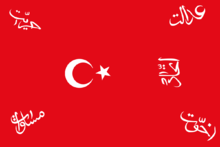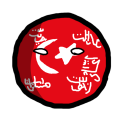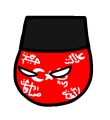İttihadism was a prominent Nationalist ideology in the Ottoman Empire, that came about after the Young Turk Revolution of 1908. Whilst the Revolution resulted in Education reform, the Secularization of Ottoman society and the expansion of women's rights, it also led to the rise of Turkish Nationalism, that culminated in the Armenian Genocide of 1915-1917. It was the official ideology of the Committee of Union and Progress.
Beliefs
 Nationalism
Nationalism
The leadership of the Committee of Union and Progress (CUP) was always ![]() Nationalist, but they didn't stress it until the Balkan Wars of 1912-1913, so not to worry the non-Turkish population of the Ottoman Empire. A big problem for the CUP was that the majority of Turks inhabiting the Ottoman Empire didn't see themselves as Turkish, but as Sunni Muslims who spoke the Turkish Language. To overcome this the CUP planned to revolutionise Turkish society to make the Turks aware of their Turkish identity.
Nationalist, but they didn't stress it until the Balkan Wars of 1912-1913, so not to worry the non-Turkish population of the Ottoman Empire. A big problem for the CUP was that the majority of Turks inhabiting the Ottoman Empire didn't see themselves as Turkish, but as Sunni Muslims who spoke the Turkish Language. To overcome this the CUP planned to revolutionise Turkish society to make the Turks aware of their Turkish identity.
 Cult of Science
Cult of Science
The CUP believed that the reason why the western world had became so successful in spreading their culture and beliefs around the world was their scientific advancement. The CUP wanted to form a ![]() "Cult of Science" and they were greatly influenced by
"Cult of Science" and they were greatly influenced by ![]() Auguste Comte and
Auguste Comte and ![]() Gustave Le Bon. The Unionists were strong believers in countries being
Gustave Le Bon. The Unionists were strong believers in countries being ![]() ruled by a group of Scientists. The main problem preventing this from happening was the fact that the Ottoman Empire was a third world country and that the majority of the Muslim population was illiterate, therefore the populace didn't know much about science. The CUP were obsessed with science and many of their leaders were fascinated by chemistry. The Unionists believed that they were "societal doctors" who would apply modern scientific methods to solve all social problems. The CUP saw themselves as the
ruled by a group of Scientists. The main problem preventing this from happening was the fact that the Ottoman Empire was a third world country and that the majority of the Muslim population was illiterate, therefore the populace didn't know much about science. The CUP were obsessed with science and many of their leaders were fascinated by chemistry. The Unionists believed that they were "societal doctors" who would apply modern scientific methods to solve all social problems. The CUP saw themselves as the ![]() Scientocrats who would save the empire with science.
Scientocrats who would save the empire with science.
 Social Darwinism
Social Darwinism
As well as having great faith in science, the CUP supported ![]() Social Darwinism and the Scientific Racism that dominated Germany during the early 20th Century. Whilst the CUP weren't always proponents of
Social Darwinism and the Scientific Racism that dominated Germany during the early 20th Century. Whilst the CUP weren't always proponents of ![]() Social Darwinism, as they changed their beliefs on the subject depending on who was in charge and they would quite often change their beliefs from
Social Darwinism, as they changed their beliefs on the subject depending on who was in charge and they would quite often change their beliefs from ![]() Pan-Islamism,
Pan-Islamism, ![]() Pan-Turkism to
Pan-Turkism to ![]() Ottomanism, depending on whether it was convenient to them or not. The only thing that mattered was that the Ottoman Empire would become a world power again. In fact originally the CUP didn't promote
Ottomanism, depending on whether it was convenient to them or not. The only thing that mattered was that the Ottoman Empire would become a world power again. In fact originally the CUP didn't promote ![]() Social Darwinism and even saw the
Social Darwinism and even saw the ![]() Armenian Revolutionary Federation as potential allies not an inferior race. But eventually the
Armenian Revolutionary Federation as potential allies not an inferior race. But eventually the ![]() Social Darwinism factions of the CUP gained control of the party.
Social Darwinism factions of the CUP gained control of the party.
 Pan-Islamism
Pan-Islamism
During the Hamidian Regime of Sultan Abdulhamid II ![]() Pan-Islamism became the state ideology, as Abdulhamid often stressed being the Caliph. The idea of Abdulhamid being the Caliph was very popular in
Pan-Islamism became the state ideology, as Abdulhamid often stressed being the Caliph. The idea of Abdulhamid being the Caliph was very popular in ![]() the Raj. Even though the Young Turks deposed Abdulhamid in 1909 and put Mehmed V in power, they still promoted
the Raj. Even though the Young Turks deposed Abdulhamid in 1909 and put Mehmed V in power, they still promoted ![]() Pan-Islamism. This was because if the Ottoman Sultan was the Caliph then the loyalty of the Muslims under Ottoman control would theoretically be ensured. The fact that Indian Muslims were more loyal to the Ottoman Caliph than to the British Empire was a big concern for the British.
Pan-Islamism. This was because if the Ottoman Sultan was the Caliph then the loyalty of the Muslims under Ottoman control would theoretically be ensured. The fact that Indian Muslims were more loyal to the Ottoman Caliph than to the British Empire was a big concern for the British.
 Modernization
Modernization 
Whilst the CUP would promote ![]() Pan-Islamism, they had always been a
Pan-Islamism, they had always been a ![]() secular organization. The Unionists cracked down upon
secular organization. The Unionists cracked down upon ![]() Islamic Fundamentalists after the 1909 Counterrevolution which would strain the Union's relationship with the Ulema, but they would promote
Islamic Fundamentalists after the 1909 Counterrevolution which would strain the Union's relationship with the Ulema, but they would promote ![]() Islamism during the First World War to rile up the Muslim population of the Ottoman Empire. But the CUP still saw themselves as a
Islamism during the First World War to rile up the Muslim population of the Ottoman Empire. But the CUP still saw themselves as a ![]() Secular and Modernizing force. An example of their modernization was the passing of the controversial 1917 "Temporal Family Law" which was viewed as a significant advance in
Secular and Modernizing force. An example of their modernization was the passing of the controversial 1917 "Temporal Family Law" which was viewed as a significant advance in ![]() women's rights and
women's rights and ![]() Secularism in the Ottoman Empire. Women were given more power in the household, became able to divorce their husbands and polygamy was restricted.
Secularism in the Ottoman Empire. Women were given more power in the household, became able to divorce their husbands and polygamy was restricted.

Weabooism Japanophilia
The CUP were greatly influenced by Japan. The Japanese Empire had championed ![]() Pan-Asianism which had greatly inspired the CUP's
Pan-Asianism which had greatly inspired the CUP's ![]() Pan-Islamism and
Pan-Islamism and ![]() Pan-Turkism. Since Japan defeated the Russian during the Russo-Japanese War, the CUP believed that the Ottoman Empire would defeat the Western Powers in a similar war. The CUP admired the Japanese for their embracement of science without losing their "Eastern spiritual essence". In the CUP eyes this showed that they could embrace science and
Pan-Turkism. Since Japan defeated the Russian during the Russo-Japanese War, the CUP believed that the Ottoman Empire would defeat the Western Powers in a similar war. The CUP admired the Japanese for their embracement of science without losing their "Eastern spiritual essence". In the CUP eyes this showed that they could embrace science and ![]() secularism whilst also embracing
secularism whilst also embracing ![]() Pan-Islamism and keeping their Islamic identity. The fact that the Japanese Empire had defeated the Russian Empire, who were the Ottomans' main rival, made the CUP become absolute Japanophiles. The CUP intended to make the Ottoman Empire the "Japan of the Near East". The CUP saw the 1908 Young Turk Revolution as the Ottoman equivalent of the 1867-1868 Boshin War. In the west, they were terrified of the so called "Yellow Peril" (which states that the peoples of the East were going to destroy the powers of the West), but the CUP were excited by the idea of the Western Empires being terrified of the Eastern peoples.
Pan-Islamism and keeping their Islamic identity. The fact that the Japanese Empire had defeated the Russian Empire, who were the Ottomans' main rival, made the CUP become absolute Japanophiles. The CUP intended to make the Ottoman Empire the "Japan of the Near East". The CUP saw the 1908 Young Turk Revolution as the Ottoman equivalent of the 1867-1868 Boshin War. In the west, they were terrified of the so called "Yellow Peril" (which states that the peoples of the East were going to destroy the powers of the West), but the CUP were excited by the idea of the Western Empires being terrified of the Eastern peoples.
 Nation In Arms
Nation In Arms
The CUP were greatly influenced by Colmar Freiherr von der Goltz's idea of a "Nation in Arms". The Japanese Empire had a code of Bushido (The Way of the Warrior) and indoctrinated all Japanese young men into believing that there was no thing more honourable than to fight (and die if necessary) to protect the Emperor. The Unionists were impressed by how well the Japanese fought in the Siege of Port Arthur, where thousands of Japanese soldiers were mown down by Russian Machine Guns, but they kept advancing out of love for the Emperor. The CUP wanted to emulate Bushido and the ![]() Ultranationalist Culture of Japan. The Unionists also observed the Russian troops, tired and not even knowing why they were in Manchuria or at war with the Japanese in the first place, and concluded 7that troops needed a reason to fight or they wouldn't be effective soldiers. A major factor in the İttihadist ideology was the "Devaluation of Life" which was the belief that the Japanese, Turks and various other "people's of the east" didn't care if their lives were sacrificed for the greater good, but westerners foolishly clung onto their lives with all their might. They believed that the Ottoman troops would be motivated to fight for the concept of
Ultranationalist Culture of Japan. The Unionists also observed the Russian troops, tired and not even knowing why they were in Manchuria or at war with the Japanese in the first place, and concluded 7that troops needed a reason to fight or they wouldn't be effective soldiers. A major factor in the İttihadist ideology was the "Devaluation of Life" which was the belief that the Japanese, Turks and various other "people's of the east" didn't care if their lives were sacrificed for the greater good, but westerners foolishly clung onto their lives with all their might. They believed that the Ottoman troops would be motivated to fight for the concept of ![]() Jihad, and dying for the Ottoman Caliph. War, according to the Unionists, just came down to who had the strongest will to fight.
Jihad, and dying for the Ottoman Caliph. War, according to the Unionists, just came down to who had the strongest will to fight.
 National Economy
National Economy 
Before the 1908 Revolution, the CUP would boycott US goods and shut down the Public Debt Administration. They came up with the idea of the "National Economy" or Millî İktisat ,which combined elements of ![]() Corporatism and
Corporatism and ![]() Protectionism. The CUP wanted to create a new Bourgeoisie in the Ottoman Empire, which would be made up of members of the Proletariat. They viewed this as an effective way to combat
Protectionism. The CUP wanted to create a new Bourgeoisie in the Ottoman Empire, which would be made up of members of the Proletariat. They viewed this as an effective way to combat ![]() Capitalism. This
Capitalism. This ![]() Marxist rhetoric was later used by the 3 Pasha's against Armenians, who the 3 Pasha's viewed as
Marxist rhetoric was later used by the 3 Pasha's against Armenians, who the 3 Pasha's viewed as ![]() Bankocrats who had stolen wealth from the Turkish people. This rhetoric was later copied by the
Bankocrats who had stolen wealth from the Turkish people. This rhetoric was later copied by the ![]() Nazis. The National Economy greatly influenced
Nazis. The National Economy greatly influenced ![]() Kemalism's economic policies.
Kemalism's economic policies.
 Authoritarian Democracy
Authoritarian Democracy
According to Turkish historian Handan Nezir Akmeșe, the commitment of the CUP to the 1876 constitution that they claimed to be fighting for was only "skin deep", and was more of a rallying cry for popular support than anything else.
 Anti-Socialism
Anti-Socialism
After realizing that the Young Turks were not fulfilling their pre-1908 promises, workers from all the different nationalities and ethnic groups of the Ottoman Empire went on strike. Groups like the ![]() Socialist Workers' Federation and
Socialist Workers' Federation and ![]() Ottoman Socialist Party were founded. The Young Turks were afraid of international solidarity between workers and enacted the Tatil-i Eşgaal Kanunu. In the Late Ottoman Genocides, socialist intellectuals were exiled.
Ottoman Socialist Party were founded. The Young Turks were afraid of international solidarity between workers and enacted the Tatil-i Eşgaal Kanunu. In the Late Ottoman Genocides, socialist intellectuals were exiled.
Personality
Before 1913 İttihadism isn't as racist as he becomes after 1913. After 1913 he becomes a psychopathic maniac who goes on killing sprees whenever he sees Armenians, Assyrians and Greeks.
How to draw

- Draw a ball
- Draw the crescent moon and the star (like the Turkish flag)
- Color the ball in red
- Color the crescent moon and the star in White
- Draw the Turkish words surrounding the crescent moon and the star (like the Young Turk flag), the words should be in white
- Add the eyes and you're done
| Color Name | HEX | RGB | |
|---|---|---|---|
| Red | #E30A17 | 227, 10, 23 | |
| White | #FFFFFF | 255, 255, 255 | |
Relationships
Ashab (Friend)
 Bismarckism - Fellow Central Power member!
Bismarckism - Fellow Central Power member! Nazism - Nuri Pasha assisted you creating the East-Turkestan Schutzstaffel.
Nazism - Nuri Pasha assisted you creating the East-Turkestan Schutzstaffel. Showa Statism - A great example for Asia in the modern age.
Showa Statism - A great example for Asia in the modern age. Scientocracy - We need a cult of science to fix the Empire's problems!
Scientocracy - We need a cult of science to fix the Empire's problems! Constitutional Monarchism - The 1908 Revolution was based.
Constitutional Monarchism - The 1908 Revolution was based. Ethnonationalism - TURKS NUMBER 1!
Ethnonationalism - TURKS NUMBER 1! Pan-Turkism - We are all Turks!
Pan-Turkism - We are all Turks! Pan-Islamism - Very based.
Pan-Islamism - Very based. Social Darwinism - Those weak Armenians, Assyrians, and Greeks will all just die out
Social Darwinism - Those weak Armenians, Assyrians, and Greeks will all just die out Turkish Idealism - Very close to me.
Turkish Idealism - Very close to me. Conservative Feminism - This is my kind of Feminism!
Conservative Feminism - This is my kind of Feminism! Reactionary Modernism - Based.
Reactionary Modernism - Based. East Turkistan Separatism - I supported your struggle for an independent Turkeistan republic![3]
East Turkistan Separatism - I supported your struggle for an independent Turkeistan republic![3]
Esmaç (Mixed)
 Islamic Theocracy and
Islamic Theocracy and  Jihadism - You can be useful to inspire the troops, but stop trying to make the Empire a Theocracy!
Jihadism - You can be useful to inspire the troops, but stop trying to make the Empire a Theocracy! Ottomanism and
Ottomanism and  Reactionaryism - Don't you realize that I only try to fix the problems you couldn't?
Reactionaryism - Don't you realize that I only try to fix the problems you couldn't?
Hasım (Enemies)
 Absolute Monarchism - F*ck off Abdul Hamid!
Absolute Monarchism - F*ck off Abdul Hamid! Neo-Ottomanism - You simp for Abdul Hamid, so f*ck you too! (but You still defend me and what I did to the Armenians, Greeks and Assyrians, so...)
Neo-Ottomanism - You simp for Abdul Hamid, so f*ck you too! (but You still defend me and what I did to the Armenians, Greeks and Assyrians, so...) Kemalism - You were inspired by me, but you chose liberal democracy instead of strong military leadership plus you punished me for the non-existent Armenian genocide.
Kemalism - You were inspired by me, but you chose liberal democracy instead of strong military leadership plus you punished me for the non-existent Armenian genocide. At least you spared many of them who were initially scheduled to be executed by the foreign forces. Marxism-Leninism - The Turkic people will be free from your tyranny!
Marxism-Leninism - The Turkic people will be free from your tyranny! Orthodox Theocracy - Filthy Armenians, Greeks, and Assyrians! YOU DO NOT BELONG ON ANATOLIA!
Orthodox Theocracy - Filthy Armenians, Greeks, and Assyrians! YOU DO NOT BELONG ON ANATOLIA! Metaxism - Hell*nic scum.
Metaxism - Hell*nic scum. Venizelism - Read above.
Venizelism - Read above. Separatism - HOW DARE YOU BREAK AWAY FROM THE GLORIOUS EMPIRE!
Separatism - HOW DARE YOU BREAK AWAY FROM THE GLORIOUS EMPIRE! Left-Wing Nationalism - Disgusting Armenian terrorists trying to divide the Ottoman empire and ruin it! Also, FUCK YOU FOR KILLING TALAAT PASHA AND CEMAL PASHA!!!
Left-Wing Nationalism - Disgusting Armenian terrorists trying to divide the Ottoman empire and ruin it! Also, FUCK YOU FOR KILLING TALAAT PASHA AND CEMAL PASHA!!! Liberal Socialism and
Liberal Socialism and  Progressivism - No, I'm nothing like the modern day "Young Turks"
Progressivism - No, I'm nothing like the modern day "Young Turks" Bidenism - Stop acting like I killed Armenians.
Bidenism - Stop acting like I killed Armenians. Anationalism - Huh? Anatolianism? Not sure about tha... Oh, it's "Anationalism". Well, fuck you.
Anationalism - Huh? Anatolianism? Not sure about tha... Oh, it's "Anationalism". Well, fuck you.
Gallery
-
Original image
-
-
More Information
Wikipedia
- İttihadism
- CUP
- Young Turks
- Young Turk Revolution
- Decline and modernization of the Ottoman Empire
- Modern Ottoman Army
- Dissolution of the Ottoman Empire
- Ottoman Empire in World War I
| | |
| Main Related Self-Inserts | |
| Main Definitions Application Related Other Ideologies Self-Inserts | |
Self-Inserts | |
| | |
| | |
- ↑ Riza opposed the anti-armenian laws and the genocides against armenians that was committed by the C.U.P.
- ↑ Left as soon as nationalist groups came to power
- ↑ https://en.m.wikipedia.org/wiki/Kumul_Rebellion


